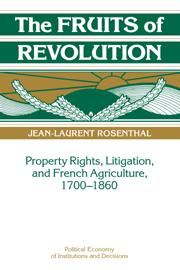Book contents
- Frontmatter
- Contents
- List of tables, figures, and maps
- Series editors' preface
- Preface
- 1 Introduction
- PART I HISTORY AND ECONOMICS
- 2 The French Revolution and French economic history
- 3 Institutions and economic growth
- PART II DRAINAGE AND IRRIGATION
- PART III PROPERTY RIGHTS AND LITIGATION UNDER ABSOLUTISM
- Appendix 1 Wages, land prices, and interest rates
- Appendix 2 Estimating rates of return
- Appendix 3 Theoretical proofs
- Bibliography
- Index
2 - The French Revolution and French economic history
Published online by Cambridge University Press: 27 March 2010
- Frontmatter
- Contents
- List of tables, figures, and maps
- Series editors' preface
- Preface
- 1 Introduction
- PART I HISTORY AND ECONOMICS
- 2 The French Revolution and French economic history
- 3 Institutions and economic growth
- PART II DRAINAGE AND IRRIGATION
- PART III PROPERTY RIGHTS AND LITIGATION UNDER ABSOLUTISM
- Appendix 1 Wages, land prices, and interest rates
- Appendix 2 Estimating rates of return
- Appendix 3 Theoretical proofs
- Bibliography
- Index
Summary
The French Revolution was long thought to have been caused by social decay compounded by two acute economic crises. The Revolution was seen as a convulsive transition from an outdated, feudal order to a new, capitalist order. The transition was precipitated by a half-century of increasing land scarcity and deteriorating standards of living topped by two consecutive harvest failures in 1788 and 1789. Adding to the trouble, the precapitalist system of taxation and borrowing no longer enabled the state to raise enough money to sustain itself. These crises were thought to have heightened class antagonism since neither clerics nor nobles paid much in the way of taxes, and being wealthy they did not experience the pangs of hunger. The third estate alone bore the full brunt of high taxes and food shortages.
The interpretation of the Revolution as a social metamorphosis has been attacked on all sides, and even the crises that were reputed to have precipitated it have come under scrutiny. Starting with Alfred Cobban, historians have emphasized that the Revolution was less the replacement of a feudal elite and order by a bourgeois elite and order than a political realignment that divided all social classes between conservatives and radicals. The Revolution was carried out primarily by lawyers and administrators rather than by a capitalist bourgeoisie. Furthermore, rural components of the Revolution – whether capitalist or conservative in their thrust – were viewed with deep suspicion by city dwellers. As a result of this scholarship, distinctions between the old and the new order have become blurred, making the Old Regime's decay less tangible.
- Type
- Chapter
- Information
- The Fruits of RevolutionProperty Rights, Litigation and French Agriculture, 1700–1860, pp. 9 - 20Publisher: Cambridge University PressPrint publication year: 1992

